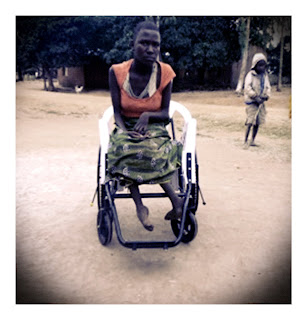It was a busy day in southern Malawi US
We distributed the first wheelchair to a boy who was born with physical challenges. His educational future was about to close down. He was unable to go to School because it had become impossible for his parents to continue to carry him 7 kilometers each way to and from school. Determined to be educated, the boy felt betrayed when he had to stay at home while the other children attended classes. But the parents had no option. They had nowhere to get help to assist them. When they heard the news about the availability of wheelchairs a relative to the boy brought to Namikango Mission a hard copy of the boy’s photo as a witness of how the boy qualifies to receive a wheelchair. It was great faith on the part of this man. He could not bring the boy such a great distance to the Mission
Before the truck could leave for the return trip to the mission, a tired, sweat covered man rushed up. “Only if possible, please help! There’s another girl, she is on the way, and she needs your help”. The man continued speaking rapidly, not even taking the time to compose himself and present a detailed message. Later, it was learned that he had met a girl who heard that we brought wheelchairs to a nearby village. The girl did not wait for help to get where we were. She started crawling on her knees. After crawled for several meters she could not get past the rocks spread out in front of her. She sat down. It was here where she met the man who advised her to wait there. The man ran to tell us about Patuma Masautso. Thankfully there was one wheelchair remaining.
The truck changed course to meet Patuma Masautso, and to learn more about her. She is from Kalino Village Yao
Having accomplished our mission we returned to Namikango. It was evident what a wheelchair can do for a person in a remote Malawian Village



No comments:
Post a Comment